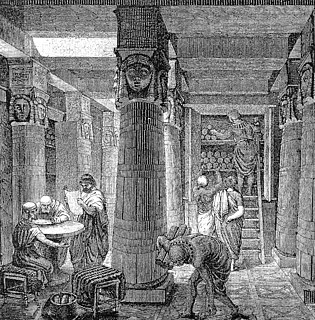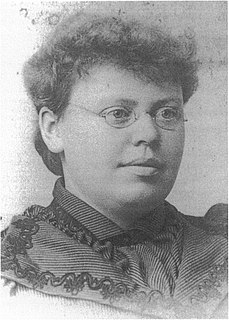Related Research Articles

Melville Louis Kossuth "Melvil" Dewey was an influential American librarian and educator, inventor of the Dewey Decimal system of library classification, a founder of the Lake Placid Club, and a chief librarian at Columbia University. He was also a founding member of the American Library Association but resigned in 1905, due to allegations of sexual harassment, racism, and antisemitism.
The American Library Association (ALA) is a nonprofit organization based in the United States that promotes libraries and library education internationally. It is the oldest and largest library association in the world, with more than 57,000 members.
The Music Library Association (MLA) of the United States is the main professional organization for music libraries and librarians. It also serves corporations, institutions, students, composers, scholars and others whose work and interests lie in the music librarianship field. National meetings occur annually.

Elonnie J. Josey was an African-American activist and librarian. Also was one of the first African American librarian in the Georgia Library Association. Josey was born Elonnie Junius Josey in Norfolk, Virginia to Willie and Frances Bailey Josey. He graduated from Howard University in 1949 and received his master's in History from Columbia University in 1950 and a master's in librarianship from the University at Albany, SUNY in 1953 being the second African American to do so. Immediately after graduating, Josey accepted a position at the Free Library of Philadelphia. From 1955 to 1959, he was Director of the Library of Delaware State College, Dover, Delaware, and from 1959–1966, he was Chief Librarian and Associate Professor at Savannah State College in Savannah, Georgia. He also served on the staff of the Columbia University Library, the New York Public Library, and prior to his position at Delaware State College, he served as Instructor of Social Sciences and History from 1954–1955 at Savannah State College.
Eric Edward Moon was a librarian and editor who had a shaping influence on American librarianship in the 1960s, 1970s, 1980s, and 1990s as editor-in-chief of Library Journal, president of the American Library Association, and chief editor at Scarecrow Press. Moon was a trailblazer and influential figure instrumental in transforming library professionalism, polity, and social responsibility.
Education for librarianship, including for paraprofessional library workers, varies around the world, and has changed over time. In recent decades, many institutions offering librarianship education have changed their names to reflect the shift from print media to electronic media, and to information contained outside of traditional libraries. Some call themselves schools of library and information science, or have dropped the word "library" altogether.

Robert Wedgeworth is an American librarian who was the founding President of ProLiteracy Worldwide, an adult literacy organization. He is also a former executive director of the American Library Association, served as president of IFLA, served as Dean of the School of Library Service at Columbia University, and was university librarian at the University of Illinois at Urbana-Champaign. He has also authored and edited several major reference works, and has won many awards over the course of his career. In 2021 the American Library Association awarded him Honorary Membership, its highest award.

Library science is an interdisciplinary or multidisciplinary field that applies the practices, perspectives, and tools of management, information technology, education, and other areas to libraries; the collection, organization, preservation, and dissemination of information resources; and the political economy of information. Martin Schrettinger, a Bavarian librarian, coined the discipline within his work (1808–1828) Versuch eines vollständigen Lehrbuchs der Bibliothek-Wissenschaft oder Anleitung zur vollkommenen Geschäftsführung eines Bibliothekars. Rather than classifying information based on nature-oriented elements, as was previously done in his Bavarian library, Schrettinger organized books in alphabetical order. The first American school for library science was founded by Melvil Dewey at Columbia University in 1887.
James F. Williams II is an American librarian. He is the Dean of Libraries at the University of Colorado at Boulder.
William Shepherd Dix was a scholar and librarian who had a 22-year career as Librarian at Princeton University in New Jersey, without a degree in library science. His contributions to the field of librarianship, however, are varied and notable, making him worthy of recognition in the American Libraries' 100 most important figures.

Carl H. Milam held many positions and made many contributions to the field of American library science. He was noted in an issue of American Libraries as one of the one hundred "most important leaders we had in the 20th century". Known mostly for his lengthy career at the American Library Association (1920–1948), he served as a leader in the association and earned the title “Mr. ALA”. Mentioned throughout the pages of A History of the American Library Association 1876-1972, Milam has proved to be an influential figure in his long history at the ALA and in the field of librarianship. He was at the forefront in providing ideas, public relations strategies, services throughout World War I and World War II, and work in the international field.
The Southeastern Library Association (SELA) is an organization that collaborates with different library associations within the Southeastern United States, including Alabama, Arkansas, Florida, Georgia, Kentucky, Louisiana, Mississippi, North Carolina, South Carolina, Tennessee, Virginia, and West Virginia.
The Minnesota Library Association (MLA) is a professional association and state chapter of the American Library Association, headquartered in Minneapolis, Minnesota.
A librarian is a person who works professionally in a library, and may hold a degree in librarianship.
Lucile M. Morsch was an American librarian who served as President of the American Library Association from 1957 to 1958. Morsch also worked as the Deputy Chief Assistant Librarian of Congress from 1953 to 1962.
Mary Elizabeth Downey was a librarian and activist who created and promoted library science education courses across the Midwestern and Western United States. She is regarded as a pioneer of the modern library movement.
The University of Chicago Extension Division Library School was one of the pioneering training programs for librarians in the United States. The library school was a section within the Extension Division's Class-Study Department. It closed in 1903 after receiving controversial criticisms from the American Library Association.

Tessa Kelso was an American publicist, journalist, and head librarian of the Los Angeles Public Library. A local Methodist minister accused her of "sin" when the library stocked a book that offended him. She sued him for malicious slander, and the case was settled in her favor, in 1895.
Evelyn May Seymour was an American librarian who collaborated closely with Melvil Dewey on the Dewey Decimal Classification (DDC). Seymour edited eight editions of the DDC.
The Seminar on the Acquisition of Latin American Library Materials (SALALM) is the oldest professional Area Studies library organization for academic librarians, archivists, book vendors, scholars, and students who specialize in Latin American and Caribbean Studies. Members are from at least 20 different countries. SALALM promotes better library services and purchasing power among individual members and member libraries. With the Secretariat based at Tulane University's Latin American Library, it is an international non-profit professional organization with three official languages: English, Spanish, and Portuguese. SALALM is an affiliate of the American Library Association. As of May 2015, the organization had 242 personal and 84 institutional members including librarians, archivists, book dealers, vendors, and university libraries.
References
- 1 2 3 Ahern, M.E. (1931). "A review of the first twenty-five years' activities of the American library institute". Libraries. 36: 309–313.
- ↑ Weigand, W.A (1994). Encyclopedia of Library History. Taylor & Francis. p. 388. ISBN 978-0-8240-5787-9.
- ↑ Hitt, J.M. (1926). "A brief history of the National association of state libraries". Bulletin of the American Library Association. 20: 584.
- ↑ Kaplan, L. (1973). "Library co-operation in the United States". International Library Review. 5 (2): 139–145. doi:10.1016/s0020-7837(73)80040-8.
- ↑ "American Library Institute". American Library Association Archives. 2011.
- ↑ "American Library Institute". Bulletin of the American Library Association. 1: 490. 1910.
- ↑ Piper, T. (1975). "The American Library Institute, 1905 to 1951: An Historical Study and an Analysis of Goals". Diss. U of Wisconsin: 39–59.
- ↑ "Bibliography on the School Plant". Review of Educational Research. 5 (4): 412–439. 1935-01-01. JSTOR 1167933.